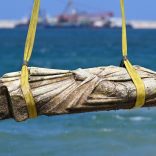Plane carrying Liberian president involved in landing scare
African corruption ‘pushing’ recruits to insurgents

AFP / Two Congolese women walk past a government army tank in Munigi, on the outskirts of Goma in the east of the Democratic Republic of the Congo.
African leaders are using their defence budgets to buy loyalty and build “patronage networks,” which is driving recruits to terrorist groups such as Boko Haram, a Transparency International report said on Tuesday.
This kind of corruption is proving to be a “push factor” for insurgent groups such as Boko Haram, al-Qaeda in the Islamic Maghreb (AQIM) and al-Shabaab in Africa, says the report, which assessed the risk of corruption in the defence institutions of 47 African countries.
“While ideological factors have certainly pushed new recruits to these organizations, the role of corruption as a ‘push’ factor cannot be underestimated,” it says.
“After all, corruption has undermined states’ perceived legitimacy and led to a sense of disillusionment and abandonment across Africa.”
Military spending increased by 91% in Africa in the past decade but anti-corruption bodies, audit functions and parliamentary committees are missing in most countries, says the report.
“By treating the defence sector as exceptional, its efficiency has been undermined,” it says.
The watchdog group’s programme manager for conflict and insecurity, Leah Wawro, cites an incident in the Democratic Republic of Congo, in which the government bought three separate types of tanks “with no clear rationale” as an example of a non-transparent procurement decision.
Wawro said corruption often had a negative effect on soldiers.
When commanders are skimming off the top and wages aren’t paid correctly, it has a range of negative effects, specifically on morale, she said.
It can also lead to militaries becoming involved in smuggling and bribery, she added.
The report gives numerous examples of corruption among troops, including military personnel in Tanzania being involved in the highly lucrative trade of elephant tusks and of Somali officers selling assault rifles to insurgent group al-Shabaab.
Although graft varies between states there is no country in Africa whose defence sector is “not vulnerable to corruption”, says Wawro, adding that international arms exports are profiting from conflict and insecurity on the continent.
Foreign governments have undue political influence on the defence procurement decisions in 70 per cent of the countries surveyed, the report says.
China, the United States, France and Russia have all sought to take advantage of Africa’s increased defence spending through weapons sales.













Leave a Reply
Be the First to Comment!
You must be logged in to post a comment.
You must be logged in to post a comment.